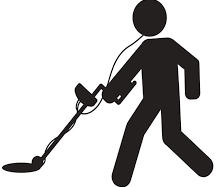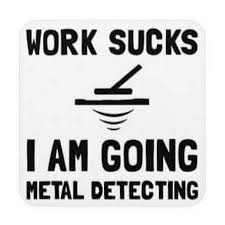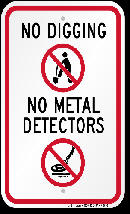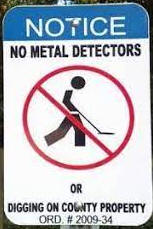

Banned Metal Detecting:
Metal Detecting Early Years
A very early Federal act AAA-American Antiquities Act of 1906 is a very broad Federal law that addressed historical sites. However, it had little to no impact on metal detecting before the ARPA act in 1979.
In the early years, 1950s - 1980s, there were few detectorists in the hobby and no local or state laws against metal detecting. The hobby was pretty much a user’s choice of where and how to practice metal detecting on most public lands.
How Did Change in Law and Attitude Come About?
 The change in attitude towards metal detecting started
to take place with the passing of the Federal
ARPA-Archaeological Resources Protection Act of 1979.
This act set the stage for the establishment of federal,
state and local agencies to identify and define
archaeological sites as protected and making these sites
off limits to many people related activities including
the hobby of metal detecting.
The change in attitude towards metal detecting started
to take place with the passing of the Federal
ARPA-Archaeological Resources Protection Act of 1979.
This act set the stage for the establishment of federal,
state and local agencies to identify and define
archaeological sites as protected and making these sites
off limits to many people related activities including
the hobby of metal detecting.
The Federal NHPA-National Historic Preservation Act of 1966 as amended in 2000 was passed before the ARPA-Archaeological Resources Protection Act. The 1966 Act set in motion the requirements to identify structures and surrounding grounds that could be or are of historical significances and should be protected for future generations of Americans.
Following are two major Federal acts were passed after ARPA:
Each of these acts are more specific in their protection of certain human remains, lands and sites.
The adoption of these five acts at the Federal Government level put in place the ability for states and local governments to follow suit and either adopt these acts in whole as their state law or to write their own regulations and laws to complement the Federal Acts.
Examples of direct regulations against metal detecting may be worded similar to the following:
 Today, the result of these five Federal acts is that more and
more local cities, towns, schools and counties are closing their
public land to metal detecting. The type of regulation that is
being put in place against metal detecting can be either
directly related or indirectly related to the metal detecting
hobby.
Today, the result of these five Federal acts is that more and
more local cities, towns, schools and counties are closing their
public land to metal detecting. The type of regulation that is
being put in place against metal detecting can be either
directly related or indirectly related to the metal detecting
hobby.
Since the adoption of the ARPA-Archaeological Resources Protection Act of 1979 archaeologist have been hired at almost all levels of government to identify archaeological sites and to get regulations and laws passed to protect archaeological sites. During the past 20 years this has taken place at a rapid rate in the U.S. Archaeologist have also contributed to a negative attitude toward detectorist that has permeated all levels of government and the public at large.
Keep in mind that metal detecting hobbyist do not have a voice in Federal or State governments. There is not a strong metal detecting association in the U.S. that can represent metal detectorists. However, there have been cases of hobby support by local metal detecting clubs in some communities. This is rare but it does happen.
Another contributing factor is that many detectorists do not practice good target recovery methods on public grounds. This has caused many cities, towns and counties to create laws or regulations that impact metal detecting on non-related archaeology sites. (parks and beaches in general)

Never bring shovels, spades or any digging tool that should only be used in a garden to recover a coin target in a park.
Tools of the trade to recover a coin target are: 10 inch- ¼ inch shaft screw driver, 6-to-8-inch knife, a drop cloth and an electronic pin pointer.
Also carry a bag or apron where you can place trash that is recovered while metal detecting.
What Can Be Done?
Manufacturers, distributors and dealers must step-up and provide hands on training for every new detector sold before it is taken into possession much like when you purchase a fire arm. In most states to purchase a fire arm you must first go to a class on safe and proper operation. Strong manufacture involvement is a requirement not just a pamphlet but hands on how to practice the hobby correctly and safely. Individuals who metal detect must take ownership for their behavior and practice Responsible Metal Detecting while out detecting.
 Responsible Metal Detecting is to:
Responsible Metal Detecting is to:
These small steps will not do away or improve the current metal detecting environment in the U.S. but may slow the change that is currently taking place which is to eliminate the use of metal detectors on public property.
- I was told in a gruff kind of way by a parks and recreation
worker to leave the park, that all parks in city were being
banned to metal detecting. The park employee said som
 eone in the
past had created holes in the park ground while metal detecting
and the city had banned future use of metal detectors.
eone in the
past had created holes in the park ground while metal detecting
and the city had banned future use of metal detectors. - I was told last year by a park worker that I could not metal detect in their part. But I had called the park director before I went and he told me it was ok. I told the park employee that if he didn't believe me call the park director. He then said ok.
- I was told that metal detectors may be used on DNR land or waters only for locating specific lost personal items. A special permit is required.
- I was camping at my favorite state park for a few days. I went metal detecting and pulled up a lot of clad, on the 2nd day I was just filling a hole when one of the rangers came up. He asked me what I found, I showed him, he took a pause and asked if I had the park managers permission to metal detect. I know the rules, I read everything about metal detecting state parks. I have been metal detecting this park every summer for years. I said I did not and he took another pause and said that he would consider giving me permission to metal detect there but only at the beach. The next day I looked in the park store and there was a sign posted on the door that read "Metal Detecting is Prohibited in this State Park and Legal Action Will Be Taken."
- I was detecting for about a half hour when a police officer
walked up and exchanged pleasantries. I said I was just
detecting for a few coins. The officer said, "I
 know I've been
watching you for a while, and I like what I saw. You made two
trips to the trash can and I can't tell where you have been
digging. Just wanted to say thanks, and keep doing what you are
doing. The problem is that someone from the Parks and Recreation
Program may run you off. They don't even allow tent pegs in the
ground." About a half hour later the Parks and Recreation guy
shows up and I was tossed out of the park.
know I've been
watching you for a while, and I like what I saw. You made two
trips to the trash can and I can't tell where you have been
digging. Just wanted to say thanks, and keep doing what you are
doing. The problem is that someone from the Parks and Recreation
Program may run you off. They don't even allow tent pegs in the
ground." About a half hour later the Parks and Recreation guy
shows up and I was tossed out of the park. - People will call the police on you just for having a detector. You have not broken any laws or dug any unsightly holes. You are just enjoying the hobby. The cops come over and usually say you need to leave or just move along. Sometimes the police are open to metal detecting and after a few questions leave you alone. However, if a park ranger comes to check out the complaint be prepared to leave immediately or get a ticket
Metal Detecting Early Years
A very early Federal act AAA-American Antiquities Act of 1906 is a very broad Federal law that addressed historical sites. However, it had little to no impact on metal detecting before the ARPA act in 1979.
In the early years, 1950s - 1980s, there were few detectorists in the hobby and no local or state laws against metal detecting. The hobby was pretty much a user’s choice of where and how to practice metal detecting on most public lands.
How Did Change in Law and Attitude Come About?
 The change in attitude towards metal detecting started
to take place with the passing of the Federal
ARPA-Archaeological Resources Protection Act of 1979.
This act set the stage for the establishment of federal,
state and local agencies to identify and define
archaeological sites as protected and making these sites
off limits to many people related activities including
the hobby of metal detecting.
The change in attitude towards metal detecting started
to take place with the passing of the Federal
ARPA-Archaeological Resources Protection Act of 1979.
This act set the stage for the establishment of federal,
state and local agencies to identify and define
archaeological sites as protected and making these sites
off limits to many people related activities including
the hobby of metal detecting.The Federal NHPA-National Historic Preservation Act of 1966 as amended in 2000 was passed before the ARPA-Archaeological Resources Protection Act. The 1966 Act set in motion the requirements to identify structures and surrounding grounds that could be or are of historical significances and should be protected for future generations of Americans.
Following are two major Federal acts were passed after ARPA:
Each of these acts are more specific in their protection of certain human remains, lands and sites.
The adoption of these five acts at the Federal Government level put in place the ability for states and local governments to follow suit and either adopt these acts in whole as their state law or to write their own regulations and laws to complement the Federal Acts.
Examples of direct regulations against metal detecting may be worded similar to the following:
- Metal Detectors: No person shall use a metal detector or similar device on parklands, except as provided in a written permit granted by the General Manager of the District.
- It shall be unlawful to use a metal detector or similar device in any District Facility or Parkland without a permit.
- Use of a metal detector in our parks is strictly prohibited.
- Prohibited Activities Defacing or Destruction of Property: No
person shall injure, deface, cut out, displace, remove, fill in,
raise, destroy, excavate, tamper, or create any disturbance to
property contained within the Park whether it be natural or
manmade.
- No artifact or any other organic or inorganic material may be removed from any historical area of the park.
- No artifact or any other organic or inorganic material may be removed from any area of the park, via metal detecting or any other form of excavation.
- It is our goal to provide as many positive recreational opportunities for park visitors as possible, and the use of metal detectors, or "treasure hunting," in the park system is not illegal. City code does not prohibit it however, it is our obligation to protect the park's resources and to ensure that damage to the park by visitors is minimized, and it is illegal to dig in any park area with any tool. Violators are subject to citation.
- Treasure hunters observed digging in the park or otherwise damaging park resources will be informed that they are breaking the law. If they continue to break the law, park staff will contact Public Safety.
With this concept in mind, park visitors with metal detectors are welcome in the parks so long as they do not do any digging. Park staff have been directed to politely ask treasure hunters to leave all digging tools outside of the park and to inform them that sifting through the top few inches of sand or fir bark in play areas is acceptable so long as they do not use any tools or inconvenience playground users. The City is, in fact, grateful for any assistance treasure hunters might render with regard to the removal of any trash or debris they might find during their hunt.
 Today, the result of these five Federal acts is that more and
more local cities, towns, schools and counties are closing their
public land to metal detecting. The type of regulation that is
being put in place against metal detecting can be either
directly related or indirectly related to the metal detecting
hobby.
Today, the result of these five Federal acts is that more and
more local cities, towns, schools and counties are closing their
public land to metal detecting. The type of regulation that is
being put in place against metal detecting can be either
directly related or indirectly related to the metal detecting
hobby.Since the adoption of the ARPA-Archaeological Resources Protection Act of 1979 archaeologist have been hired at almost all levels of government to identify archaeological sites and to get regulations and laws passed to protect archaeological sites. During the past 20 years this has taken place at a rapid rate in the U.S. Archaeologist have also contributed to a negative attitude toward detectorist that has permeated all levels of government and the public at large.
Keep in mind that metal detecting hobbyist do not have a voice in Federal or State governments. There is not a strong metal detecting association in the U.S. that can represent metal detectorists. However, there have been cases of hobby support by local metal detecting clubs in some communities. This is rare but it does happen.
Another contributing factor is that many detectorists do not practice good target recovery methods on public grounds. This has caused many cities, towns and counties to create laws or regulations that impact metal detecting on non-related archaeology sites. (parks and beaches in general)

Never bring shovels, spades or any digging tool that should only be used in a garden to recover a coin target in a park.
Tools of the trade to recover a coin target are: 10 inch- ¼ inch shaft screw driver, 6-to-8-inch knife, a drop cloth and an electronic pin pointer.
Also carry a bag or apron where you can place trash that is recovered while metal detecting.
What Can Be Done?
Manufacturers, distributors and dealers must step-up and provide hands on training for every new detector sold before it is taken into possession much like when you purchase a fire arm. In most states to purchase a fire arm you must first go to a class on safe and proper operation. Strong manufacture involvement is a requirement not just a pamphlet but hands on how to practice the hobby correctly and safely. Individuals who metal detect must take ownership for their behavior and practice Responsible Metal Detecting while out detecting.
 Responsible Metal Detecting is to:
Responsible Metal Detecting is to:- Know and Follow the Law.
- Gain Permission.
- Apply the Metal Detecting Code of Ethics.
- Join a Metal Detecting Club and National Metal Detecting Association.
- Understand the Potential Cultural Value of Your Find.
- Volunteer Your Services to the Hobby.
These small steps will not do away or improve the current metal detecting environment in the U.S. but may slow the change that is currently taking place which is to eliminate the use of metal detectors on public property.